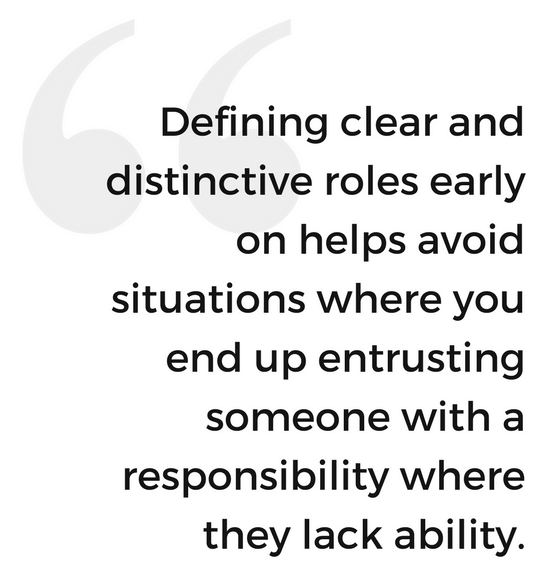 or first-time entrepreneurs, the decision of picking the right co-founder is often not appropriately considered. Sixty-five percent of companies fail due to founder conflicts, yet we convince ourselves that we are immune to such an outcome and do not give the decision the weight it deserves.
or first-time entrepreneurs, the decision of picking the right co-founder is often not appropriately considered. Sixty-five percent of companies fail due to founder conflicts, yet we convince ourselves that we are immune to such an outcome and do not give the decision the weight it deserves.
When I first started M-Farm, I wanted to transform the lives of smallholder farmers, but I knew I couldn’t do it alone. Without thinking much about what was required, I enlisted the help of a friend. At the time, this seemed to be the right thing to do, if for no other reason than because it was convenient. I literally reached out to the next available friend seated across from me at the Nairobi Innovation Hub and asked, “Hey, I need to do this. Do you want to join me?” And she said yes.
I know what you are thinking. Who does that, right? Well, in a moment of excitement, I picked the most comfortable option – and so have many other entrepreneurs. In making such rash decisions, we don’t put the needs of the company first, and often leave ourselves vulnerable to inevitable disaster.
Right away, my co-founder and I got to work doing market analysis. A few weeks down the line it was announced that IPO48, a startup tech competition, was coming to Nairobi. The competition required that each team build a solid business idea in web or mobile innovations in 48 hours. In the second round of elimination, one of the requirements was to mimic a real organization, with team members who filled main positions like the CTO and CMO.
 To fill these roles, the organizers suggested that all teams in the competition pick members from the audience, a diverse group of business students, techpreneurs and the teams that didn’t make it through the first and second round of elimination. Three other ladies joined our team, which saved us from getting eliminated, and after two hellish days of competition anxiety, M-Farm emerged the winner.
To fill these roles, the organizers suggested that all teams in the competition pick members from the audience, a diverse group of business students, techpreneurs and the teams that didn’t make it through the first and second round of elimination. Three other ladies joined our team, which saved us from getting eliminated, and after two hellish days of competition anxiety, M-Farm emerged the winner.
Almost instantly, various local media outlets showed up to interview us about our plans and aspirations. We went home happy, but unprepared for the next day and for those that followed. The next morning, the local papers read, “All girls team wins Ksh 1 million (10,000 euros) IPO48 funding.” Overnight, we went from nothing to notable, and there was no turning back.
What happened after the competition is a story for another day. But these are the three lessons I learned and the steps I would take if I were to restart my journey now.
Ask the right questions
You got a light bulb. You are super excited, and you want to share it with the friends you’d want to involve. Hit the pause button, find a quiet corner, and answer these six basic questions:
1. What is the nature of this business idea? This will determine the skill set and/or experience the startup needs from its leadership.
2. What kind of business could it become? We started as a tech company and ended up being a supply chain company. Thinking about this early on helps you find someone the startup will benefit from in the long term and not someone it will outgrow in a year or two.
3. What role am I going to play in all of this? You need a compliment — not a replica — of yourself.
4. What is the number one expertise I need to find in someone else to help me start off? As you think long term, you also need to consider the skills that will be necessary to help the company succeed immediately.
5. What emotional characteristics will my ideal co-founder have? I would look for someone I can have honest conversations with — someone with whom I can be vulnerable without fear of judgment.
6. Can I afford to hire this person? If you have the capacity to hire someone, it’s best not to do so at least until you have enough clarity of where things are heading.
The list is not exhaustive, but these questions will help you determine the kind of co-founder you actually need.
Talk to as many potential co-founders as possible
 Once you know the kind of person you need, talk to as many people as possible who fit the description of your ideal co-founder. At M-Farm, I spent more time looking for our first hire than I spent getting a co-founder. Talk to your potential co-founder about the big picture and what their role would look like as they contribute to it. Have both of your job descriptions ready, and go over them together.
Once you know the kind of person you need, talk to as many people as possible who fit the description of your ideal co-founder. At M-Farm, I spent more time looking for our first hire than I spent getting a co-founder. Talk to your potential co-founder about the big picture and what their role would look like as they contribute to it. Have both of your job descriptions ready, and go over them together.
Defining clear and distinctive roles early on helps avoid situations where you end up entrusting someone with a responsibility where they lack ability. It also helps the team avoid confusion and redundancy. For example, early on it may be immensely helpful to have someone creating while the other sells.
Have the tough conversation
In his article on the difference between making and breaking the co-founder dynamic, Henry May writes that having difficult and honest conversations should be day 1, hour 1, lesson 1 of any curriculum for entrepreneurs. Talk about ownership, decision-making, what will make you quit and what to do if you are no longer a good fit for each other.
Perhaps most importantly, talk about how to let go of each other if your relationship isn’t working. Get a lawyer to draw up a contract, and do things by the book. If there’s any lesson I learned in the cruelest way, it is that when shit hits the fan – and it might – it comes down to contracts and what is legally within your right to exercise when you are at odds with each other. I acknowledge that going through this process with someone you may have just met is difficult and potentially awkward, but do it anyway. Get an advisor or a negotiator involved if you have to.
Choosing a co-founder is a decision that should never be taken lightly. The choice you make right now is going to affect every decision you make hereafter.
It’s good to feel excited in the beginning. Just make sure you slow down for a minute to consider who will be your best partner in crime for the long haul. Launching and growing a startup is hard enough on its own without having to deal with the emotional whirlwind of an incompatible co-founder.



